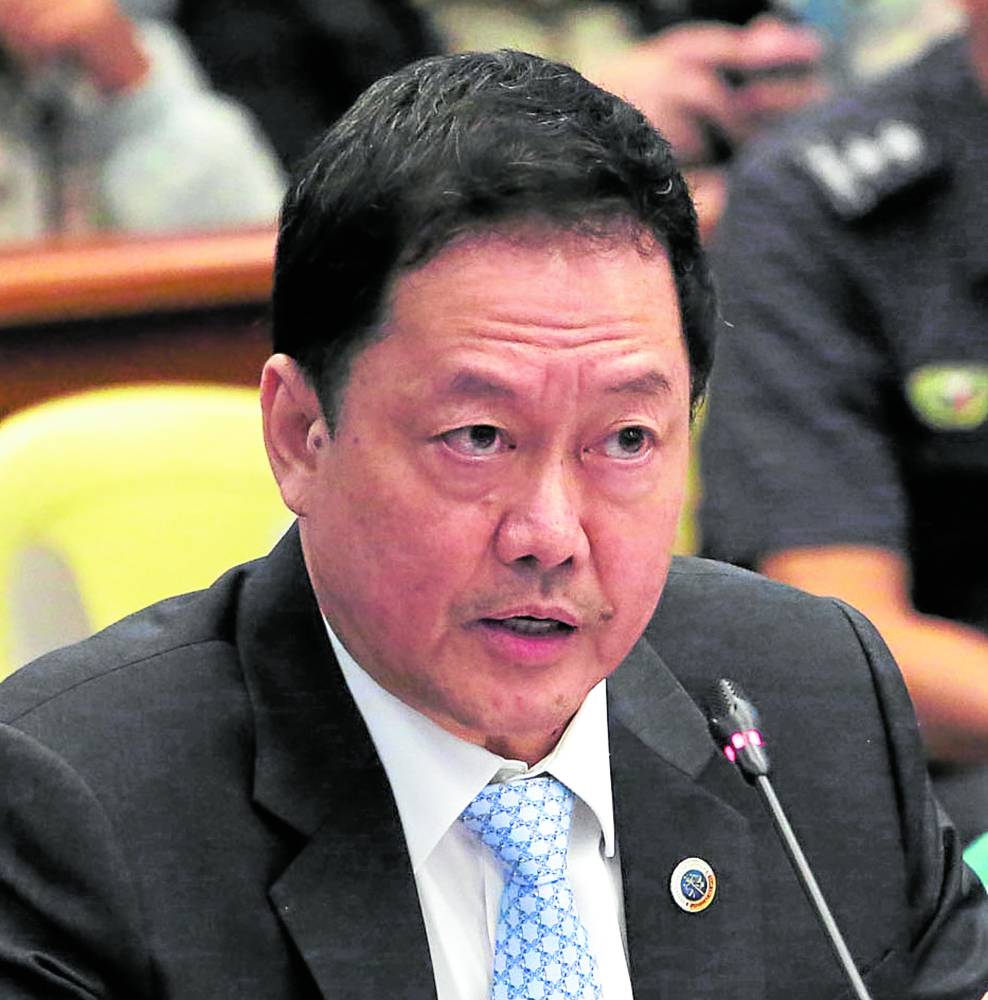
FILE PHOTO: Solicitor General Menardo Guevarra. INQUIRER
Solicitor General Menardo Guevarra said the government could create an “independent commission” to investigate the thousands of drug war killings during the administration of former President Rodrigo Duterte just to prove to the International Criminal Court (ICC) that the country’s justice system was working and the ICC should stop its own probe.
If the government proceeds with its own investigations and judicial processes, such mode of inquiry into the alleged extrajudicial killings can be explored, Guevarra said Thursday during an interview in “The Chiefs” television program.
“What I’m saying is we should be given the opportunity by the ICC. Don’t get ahead of us,” he said, addressing the international tribunal.
Guevarra, who served as Duterte’s justice secretary, said he had received several suggestions to form an independent commission to investigate the war on drugs and admitted that he “entertained the idea.”
READ: PH formally asks ICC not to reopen drug war probe
Justice Secretary Jesus Crispin Remulla also said that he got the same suggestion, but he never liked the idea. He said he saw no value in it as he assured the public that the current justice system was “competent, capable and running.”
“I’ve always looked upon it without any positive view because I’ve seen this commission’s work before and they never really did a good thing. That’s been done before with the Aquino assassination but we didn’t get anything out of it,” Remulla said.
Agrava probe
He was referring to the Agrava Commission that was formed by dictator Ferdinand Marcos following a massive outcry over the assassination of his arch-rival, the former Senator Benigno Aquino Jr., who was killed on his return form exile in the United States in August 1983.
The commission submitted a report to Marcos which concluded that the assassination of Aquino and his alleged gunman was a military conspiracy and not a communist plot as the dictator himself had declared.
READ: ICC resumes full-blown probe of Duterte drug war
In January this year, the Pre-Trial Chamber of the ICC granted the request of its prosecutor, Karim Khan, to resume his investigation of Duterte’s war on drugs from 2011 when he still mayor of Davao City until the Philippines withdrew from the Rome Statute, the treaty that create the ICC, in March 2019.
Why only now?
Duterte and senior officials of his administration had been charged with crimes against humanity in connection with the thousands of deaths in the drug war.
Former Bayan Muna Rep. Carlos Zarate, questioned Guevarra’s timing.
“Why did the government float that idea just now, when there is already an ongoing investigation by the ICC?” Zarate told the Inquirer. “The victims will think this is just one of the delaying tactics on the part of the present administration.”
READ: Justice for the dead in Duterte drug war hangs as gov’t seeks to shut ICC down
Zarate said there would be a “cloud of doubt” over the commission, despite being “independent,” and it would not stop the ICC from continuing its own investigation because it is not stated in the Rome Statute.
“In fact that’s even an admission on the part of the government that the domestic mechanisms are not working in the Philippines. Why will you create a commission now, that is independent, if indeed the domestic mechanisms when the killings happened [were working]?” Zarate pointed out.
The possibility of forming an independent commission is not out of the window yet. “It’s a matter for [the] higher-ups to make a decision on something like that,” Guevarra said.
Senator Francis Escudero said he supported the idea, but the commission would have to prove its “true independence.”
He said such a commission “will establish our independence and sovereignty, and that we can independently handle our own problems/issues.”
READ: Drug war victims’ kin tell ICC: Don’t let PH gov’t stall probe
House Deputy Minority Leader Rep. France Castro is suspicious of such a commission.
Castro told the Inquirer that it “seems to be a desperate attempt” to “further delay or stop” the ICC’s investigation.
She said the “composition and parameters” of this commission must show that it could “judiciously investigate” Duterte’s drug war.
Castro said, however, that even if an independent commission was formed, “its investigation and findings would not be equal to that of the ICC.”
“We hope that the ICC will see this ploy and not be deterred in pursuing their task,” the lawmaker said.
Panganiban’s view
It was retired Chief Justice Artemio Panganiban who first publicly suggested, in his March 6 column in the Inquirer, creating a “competent and independent body” similar to the Agrava Board to investigate the killings, identify the mastermind and prosecute those responsible while observing due process in passing judgment.
Panganiban said this was the way to stop the ICC’s investigation “and our one and only Motherland would be spared shame and ignominy before the universe.”
He suggested several former members of the Supreme Court and known professionals in business and nongovernment organization as members of the commission.
READ: Best way to stop ICC
In 2010, then President Benigno S. Aquino III issued an executive order creating a “truth commission” whose sole purpose was to investigate the alleged corruption committed during the nine-year administration of his predecessor, Gloria Macapagal-Arroyo, who is now deputy House Speaker.
The same year, the Supreme Court ruled that Aquino’s executive order was unconstitutional. In 2011, the high court upheld its earlier decision and ruled that the commission did not only violate the constitutional provision on “equal protection,” but could also serve as a tool for “vindictiveness and selective retribution.”